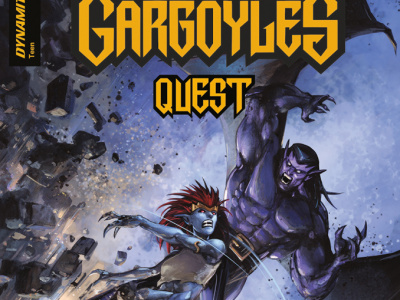Confessions of a Comic Book Guy is a weekly column by retailer Steve Bennett of Super-Fly Comics and Game sin
Bill Willingham, creator of Fables and Elementals (and future co-writer of Justice Society of America, my absolute “must read” every month) wrote a piece called “Superheroes: Still Plenty of Super But Losing Some of the Hero” that was posted on the Big Hollywood site where he says that he’s had enough of “superhero decadence.” I quote: “No more superhero decadence for me. Period. From now on, when I write within the superhero genre I intend to do it right. And if I am ever again privileged to be allowed to write Superman, you can bet your sweet bootie that he’ll find the opportunity to bring back 'and the American way,' to his famous credo.”
Maybe it’s me but I don’t see this as being in any way “controversial” but then we do tend to get a little nervous when the subject turns to "virtue," maybe because draconian methods of “preventing vice” always seems to go hand in hand with "promoting virtue" and that way leads to the Taliban. We’ve become conditioned to presume that anyone who does want to talk about it is, at best, some kind of kill-joy, blue-nose spoilsport, or at worst a conservative hypocrite trying to advance their own particular political agenda under the cover of “caring about our kids.”
Well I won’t deny that recent history gives us every reason to be suspicious but I think it would be a good idea if we started this year with a little something I like to call the presumption of good intent. I’m going to assume Mr. Willingham means what he says and isn’t harboring any ulterior motives because he believes in heroes and there are much worse things to believe in.* One look at the VH1 Sunday night lineup (Rock of Love Bus, Confessions of a Teen Idol, Tool Academy) should tell us we do ourselves no favors by wallowing in the worst that we can be.
I always seem to have questions of DC’s Dan Didio and last week over at Newsarama he answered one of mine from a previous column:
"In the decision-making process -- in other industries, you always hear about focus groups -- bringing an idea to a group of potential customers and see what they think about it. Do you have anything like that at DC?
DD: No -- we don’t. When I worked in animation -- on the ABC Saturday morning lineup, we used to do focus testing for all of our Saturday morning cartoons. The reason why we did it, and the reason why you see it with other products and not comics primarily is because the amount of investment that is made on each individual show is greater than the investment than what we make on an individual comic book. Therefore the risk is greater, so in television, we were trying to reduce the level of risk by going out to focus groups, and going out to see if people think they’re on the right track for the material or not.
"Like I said, we’re creating 55-65 comics on a monthly basis -- on a non-returnable basis -- so we can see how the sales work. Also, by putting out these 55-65 different books in different directions with different voices and different tonalities, that’s 55-65 different opportunities there -- in some ways, that’s what a focus group does. If I put out 55 books, and I find a key group that’s working better than others, we build around those that are working. In some ways, that’s like a focus test.
"Again though -- the investment we make in creating comic issues and even in new series is much less than in creating a new product line for a detergent, or starting a new television show. Our risk is reduced on the individual title basis, so we’re able to try a lot of things at the same time to see what works best."
This actually makes quite a bit of sense; “guessing” is cheap and has given us some wonderful failures in the past. The only trouble is it doesn’t address what happens when you want to try something that has historically failed in the direct sales market, like comics for girls. It seems to me if you were going to publish a comic book called Supergirl Adventures in the 8th Grade it would be worth your time to actually talk to some girls in the 8th grade.
* From the song of the same name. New Christmas songs are almost by definition awful, the exception proving the rule being “There Are Much Worse Things To Believe In”, sung by Stephen Colbert and Elvis Costello in Colbert’s TV special A Colbert Christmas: The Greatest Gift Of All. If you want to hear it just Google NPR Song of the Day There Are Much Worse Things.
The opinions expressed in this Talk Back column are solely those of the writer, and do not necessarily reflect the views of the editorial staff of ICv2.com.







